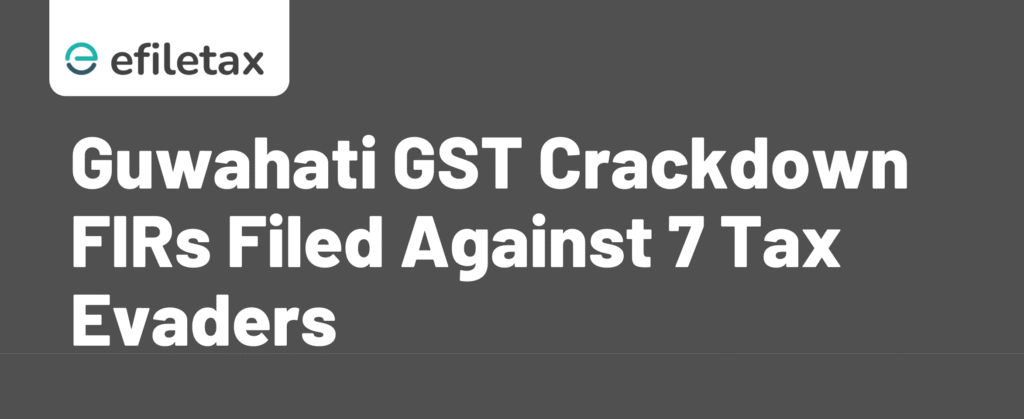
GST evaders nabbed in Guwahati What taxpayers need to know
In a recent enforcement action, GST evaders were nabbed in Guwahati and FIRs have been lodged against seven individuals for issuing fake invoices and evading tax. This crackdown by the GST authorities is part of a larger national drive to curb tax fraud, especially under Section 132 of the CGST Act, 2017.
Let’s break down what happened, the legal implications, and what every taxpayer and business owner must understand to stay compliant.
What happened in Guwahati?
- Location: Guwahati, Assam
- Action by: Central GST & Customs Department
- Offence: Issuing fake GST invoices without supply of goods or services
- No. of persons involved: 7
- Offence registered under: Section 132 of CGST Act
- Value of fake input tax credit (ITC): Likely in crores (exact figure awaited in press release)
According to a senior CGST officer, the evaders floated bogus firms, issued invoices without actual movement of goods, and passed on fake ITC to other entities.
What is Section 132 of the CGST Act?
Section 132 deals with punishment for certain offences, such as:
- Issuing invoices without actual supply (fake billing)
- Availing or passing on fraudulent Input Tax Credit (ITC)
- Collecting GST but not depositing it to the government
- Suppressing sales to evade tax
Penalties under Section 132 include:
| Offence Amount | Punishment |
|---|---|
| ₹1 crore+ | Jail up to 1 year (non-cognizable) |
| ₹2 crore+ | Jail up to 3 years (cognizable) |
| ₹5 crore+ | Jail up to 5 years + fine |
Expert Tip: If your vendor is caught in a fake invoice scam, you may also lose the ITC claimed on purchases. Always verify the GSTIN and filing status on GST Portal.
How can businesses avoid GST compliance risks?
- Verify GSTINs of all vendors using the GST portal
- Check GSTR-2B before claiming ITC — ensure the invoice appears
- Avoid dealing with suspicious suppliers offering “GST benefits”
- File returns on time to avoid penalties under Section 122
- Maintain proper e-invoicing and stock records
Legal Takeaway: GST evasion is a criminal offence
This Guwahati action reaffirms that tax fraud under GST is no longer a civil matter—it’s criminal. Businesses found guilty can face arrest without bail (in certain cases), asset attachment, and cancellation of GST registration.
GST evaders nabbed: What does it mean for honest taxpayers?
- More scrutiny in GSTR filings
- Tighter ITC eligibility checks under Rule 36(4) and GSTR-2B
- Increased audits and inspections for suspicious transactions
- Cross-verification with e-way bills and e-invoicing becoming standard
FAQ: GST Evasion and Enforcement
Q1. What happens if I unknowingly purchase from a fake firm?
A: You may lose ITC and face notices under Section 16 and Rule 36(4).
Q2. Can I be arrested under GST law?
A: Yes, if involved in fraud as per Section 132. Threshold: ₹2 crore+ for cognizable offence.
Q3. How to verify if a vendor is genuine?
A: Use GST portal: Enter their GSTIN and check return filing status and registration type.
Summary
GST evaders were nabbed in Guwahati for issuing fake invoices without supply of goods. FIRs filed against 7 persons under Section 132 of CGST Act. Businesses are urged to verify vendors and stay compliant to avoid ITC loss and legal risks.
Final Word: Let Efiletax help you stay compliant
With authorities tightening their grip on fake invoicing, don’t leave compliance to chance. Efiletax offers expert GST services — from registration and filing to vendor verification and ITC reconciliation.